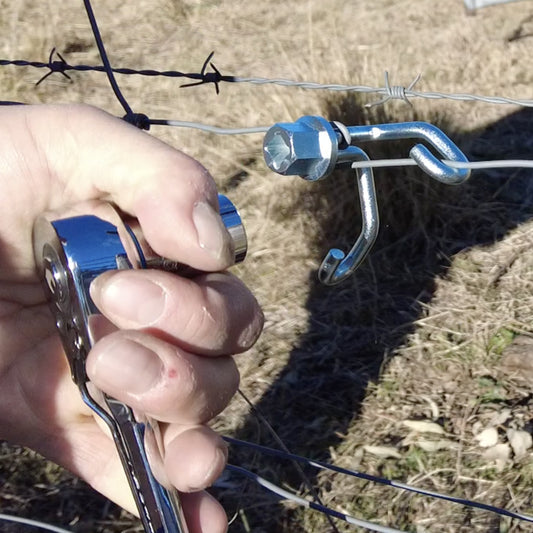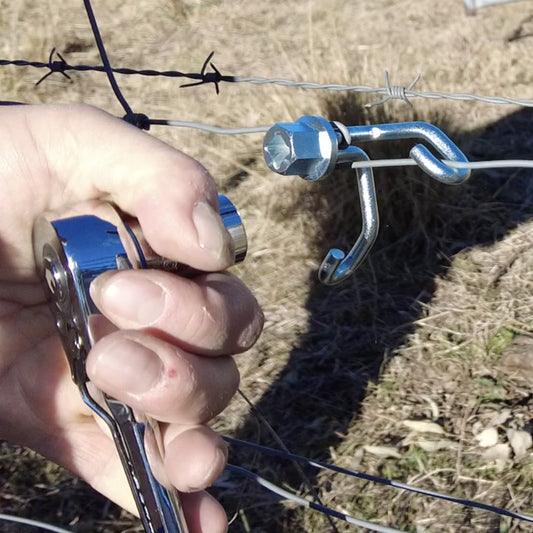Tim Thompson: Australian Made + Destructive Testing
Which wire tensioner should you use?
Wire Tensioning Methods
There’s been a lot of designs for wire grippers and tensioners over the last 100 years. But two basic problems have persisted, namely, grippers either slipping or dropping of the wire.
Before the 1970’s High Tensile (HT) wire was not commercially available so there was no real problem, but now most people use HT wire, and it is a big issue. If for no other reason than safety. It seems everyone the Wireman team have ever met that has done any fencing, has a story about wire strainers letting go and either creating a near miss or seriously injuring someone. Half a kilo of steel being thrown at you with 200kg of force behind it, is always a dangerous thing!
Wire grippers, wire grips and grabs
The majority of Wire grippers slip because the modern high tensile wire is harder than the cast metal the grippers are made of. Over time a deep groove forms between the jaws of the grip points and the wire can slip through it.
To solve the problem, we designed a gripper made from High tensile steel that was harder than HT wire so a groove can’t form. Secondly, we made them spring loaded, so you don’t have to maintain tension on the wire when handling the strainer, and a scissor like action makes them easy use - squeeze to open, release to attach.
The real beauty of these grippers is that you can attach a number of them to a board and easily strain multiple strands of wire at once, solving the problem of tensioning one strand and having some go loose. You won’t have net fencing wire slip and you can work from just one side of the fence. This single feature makes an East Ender setup 5 times faster to get on and off the wire than a standard wedge clamp board.
When it comes to putting tension on the wire, there are now really only two methods that are considered to be relatively safe and efficient.

Chain Grab or Chain Walking Wire Tensioners - STRAIN WALKER
One method is to the use of a chain walker style tensioner that hooks onto the chain and is cranked back and forth to move up the chain and tension the wire. Often preferred by fencing contractors, these strainers are simple, reliable and quick to use, especially if you are doing long runs in excess of 500 meters. Because you can simply pull the chain up to where you have basic tension and then hook it on.
The down side is that the minimum distance of tension increase is about 40mm or 1 ½ inches. This makes it difficult on a short strain to get the correct tension without either over tensioning and breaking the wire or leaving it slack. Chain walking come along’s can also be a dangerous tool. Fingers and hands are easily caught when trying to back off the tension and letting go of the handle at the wrong time can lead to a painful whack.
Lever Hoist Come Along Wire Strainers - STRAINEX
The second method is to use a lever hoist or hand winch, it is a much easier and safer way to tension because you can stand out of the line of the strain, as a result there is a lot less chance of being hit by anything should the wire break. And the ratchet mechanism provides for precision movement of as little as 3 mm or 1/8th of an inch. The only down side is, it can be a little slower to use a ratchet strainer, as you either need to wind the cable back onto the ratchet or pull the chain back through the block when doing the next strain.
Finally, to get the longest life out of the wire it’s important to have the correct tension on it. If you under strain the wire it will sag, which nobody wants, but if you over tension wire, which is easily done with a lever hoist. There is a real chance the wire will break. If not immediately, it will when the wire shrinks in cold weather. As a result, a strain gauge is useful to ensure the correct tension. Although not a necessity, they make it much easier to meet a wire manufactures specifications and help get maximum life out of a fence.
Tension Gauges for Wire Fences
Spring loaded tension gauges are tough, reliable and accurate to within 5 kilos if used correctly. Digital tension gauges on the other hand are not as robust but are highly accurate and are invaluable if you want to prove to a client your straining the wire correctly.
Wireman makes both types of wire tensioners and tension gauges so check out our range and get something that right for you. If you have any questions or comment’s please don't hesitate to get in touch by sending us an email to sales@wireman.com.au
Frequently asked questions
Which wire tensioner should I use?
The simple answer is, it depends on what length of wire you want to strain and how much fencing experience you have.
We recommend fencing contractors have both a Strain Walker and StraineX style wire Tensioner, simply because, even if you have had lots of experience using chain walking type strainers, it’s still much easier to control the tension on short strains with a lever hoist.
If you are not stretching fences on a regular basis, we recommend the StraineX tensioners, simply because they are much easier and safer to use. And you can stand out of the line of the strain, so there is a lot less chance of being hit by anything should the wire break. The ratchet mechanism makes it easy to tension accurately. And a Lever Hoist is useful for all sorts of jobs on the farm, like pulling calves or lifting a load.
Should I use a tension gauge?
The simple fact is, most people over tension, it is the single biggest reason for wires breaks in cold weather. Tension gauges are important, especially when using StraineX hoists, it’s just so easy to over tension the wire.
For everyday use, Die spring tension gauges are the best tool, as they have – “throw in the in ute“ reliability. They are designed for repeated use, and used correctly, they’re accurate to within 5 kilos.
For the fencing contractor, A digital tension gauge provides certainty that the tension on the wire is within manufacturer specifications, the proof of which can be provided with pictures.
If you have any questions about wire tensioners or any of the products in our range please give us a call on 02 9955 2264 or send us an email to sales@wireman.com.au.
Wire Tensioners
-
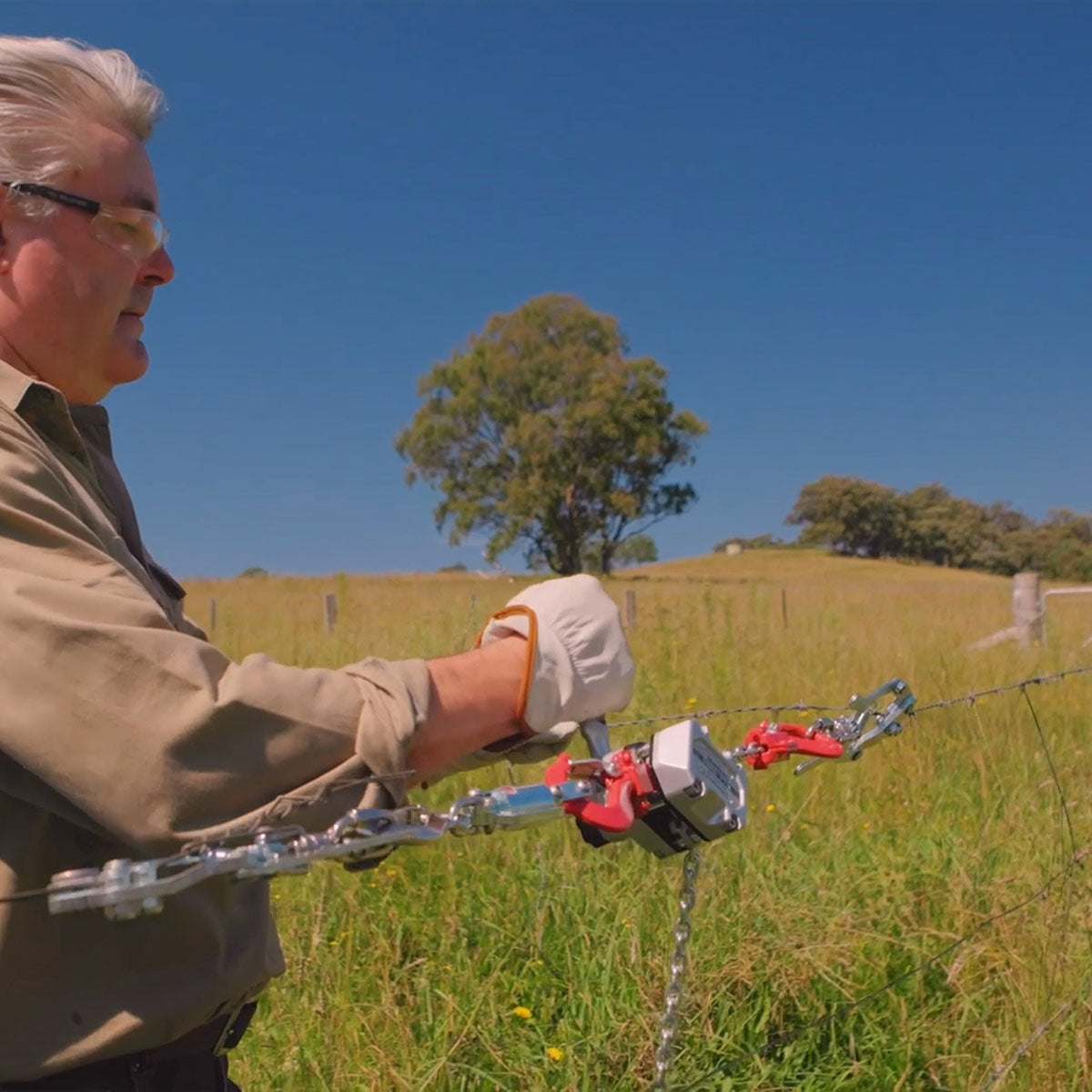
StraineX Wire Tensioning Kits
If you don't do a lot of fencing and are looking for...
-
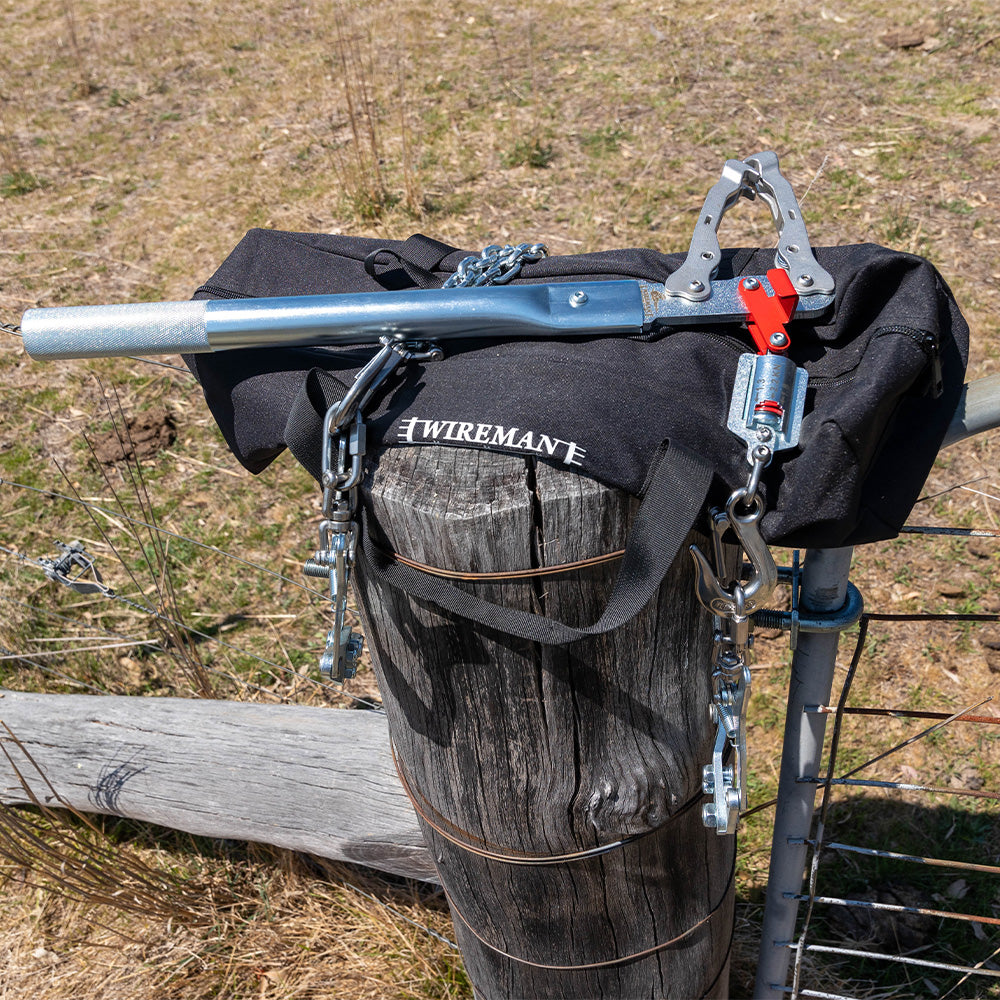
Strain Walker Wire Tensioning Kits
The chain grab walking wire tensioner or stretcher has been around for over...
-
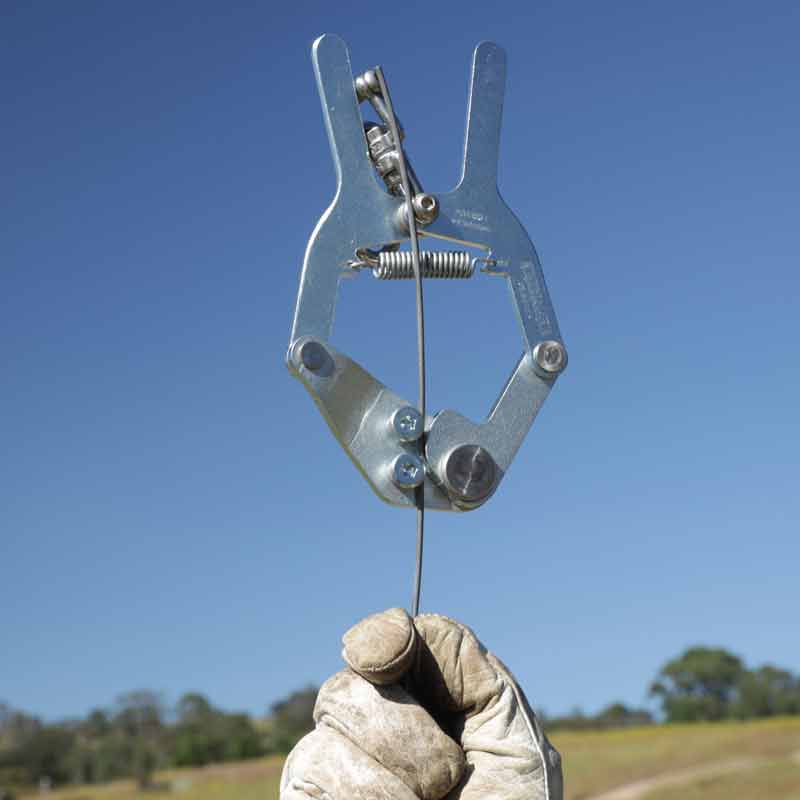
Wire Straining and Tensioning Components
Individual Wire straining and tensioning kit parts. Get just what you need or...
Strainer Board Kits and Components
-
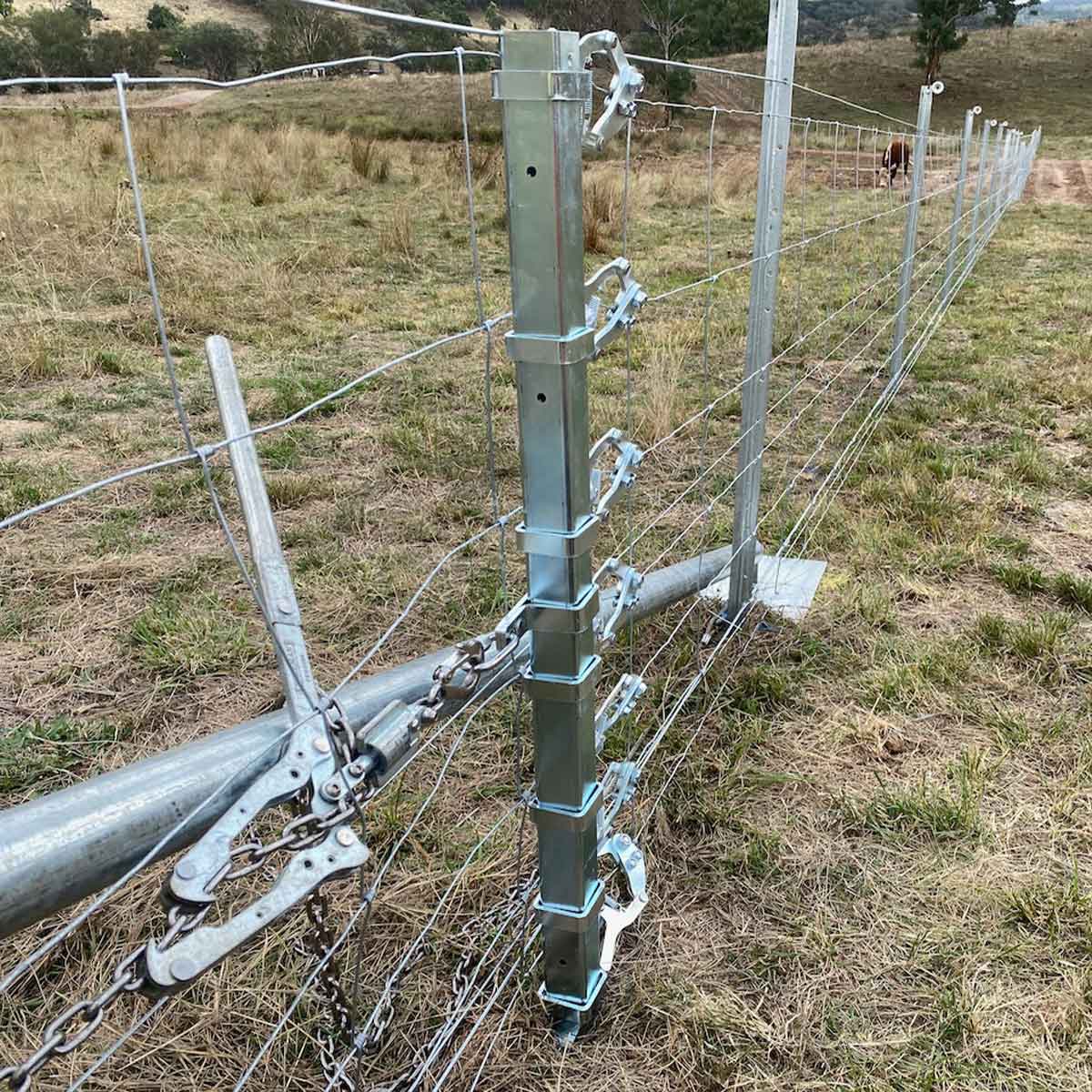
Strainer Boards
Wireman Strainer Boards - Strainer boards for straining or tensioning net fencing and fabricated netting wire.
-
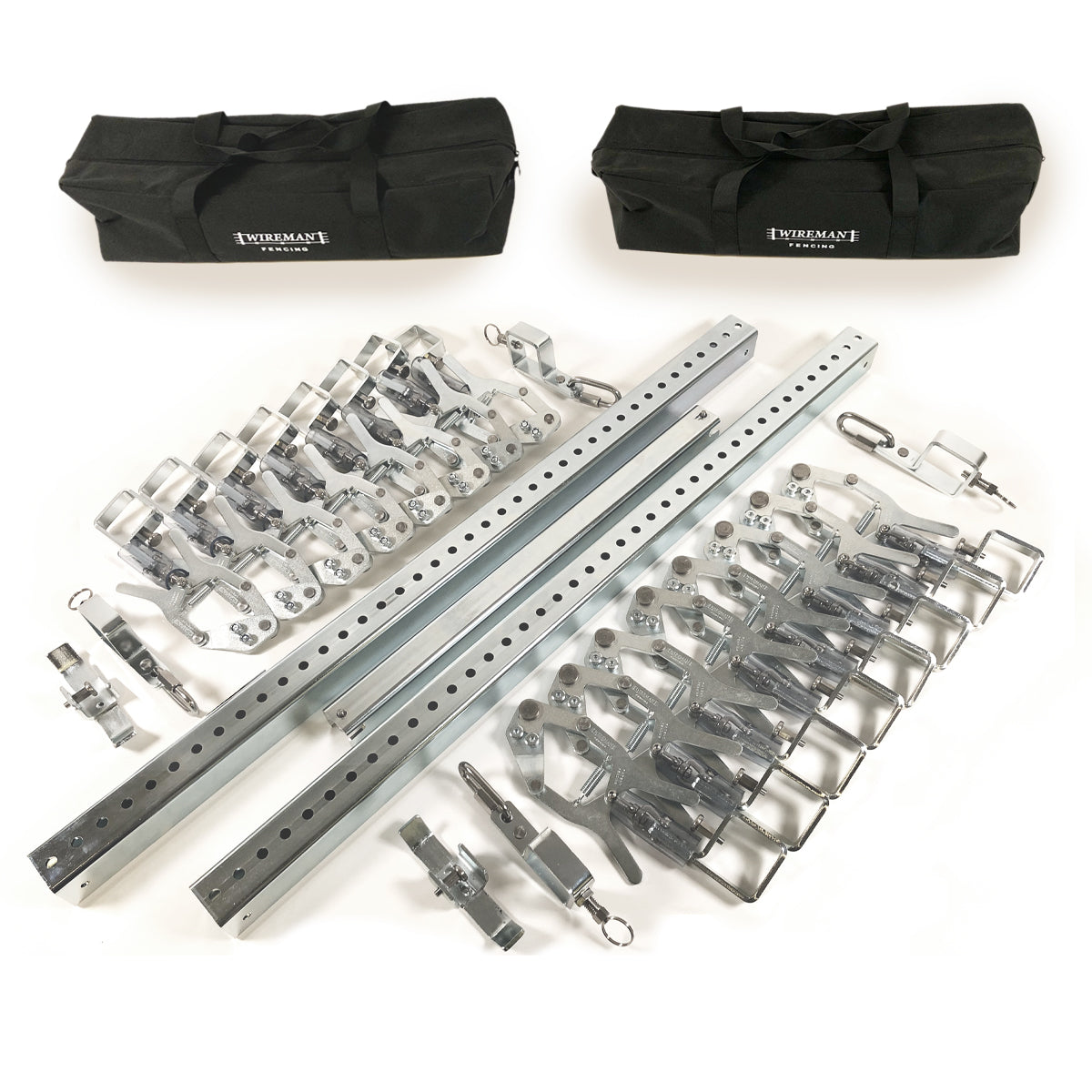
Strainer Board Components
Parts and components that can be added to a the Wireman Eastender...
BOBEX - Wire Tensioners
-
BOBEX Tub of 30
Regular price $110.00 AUDRegular price
